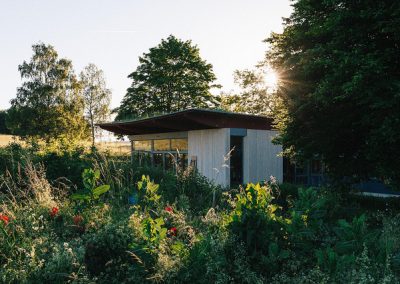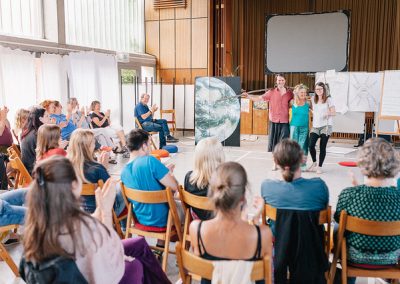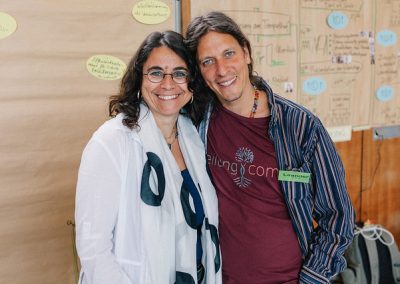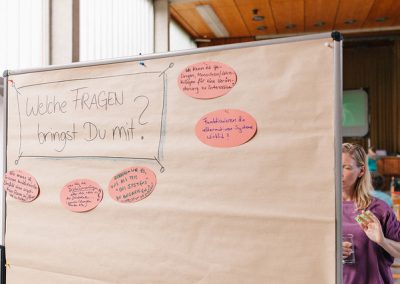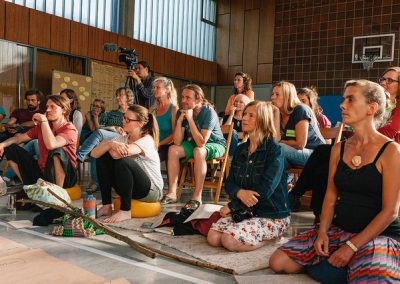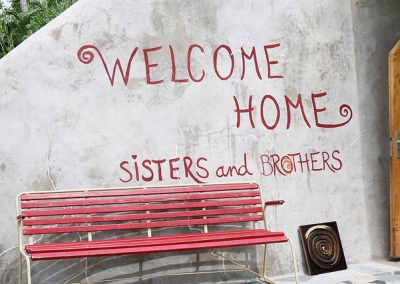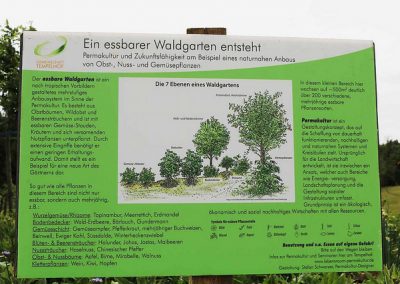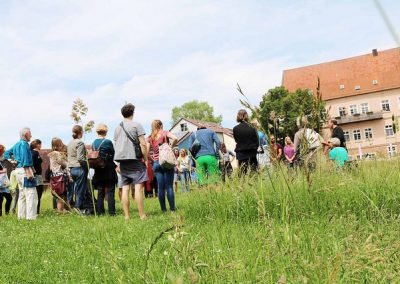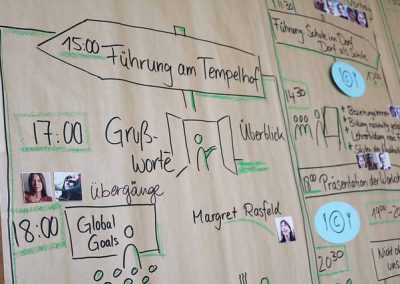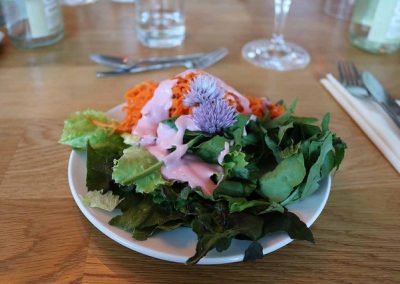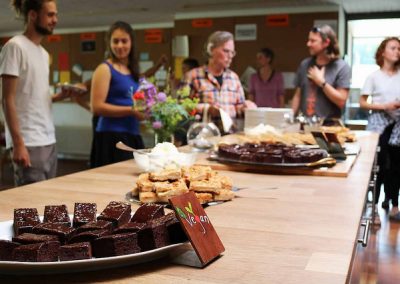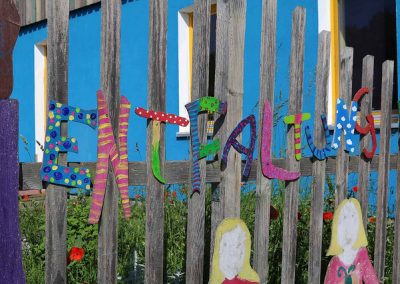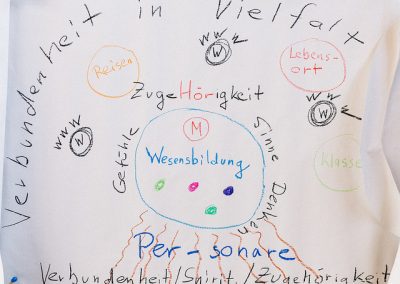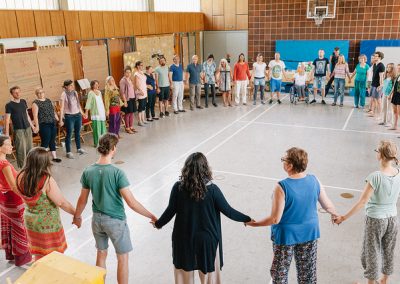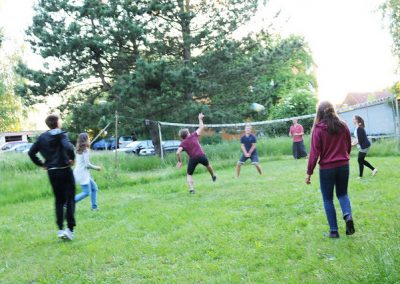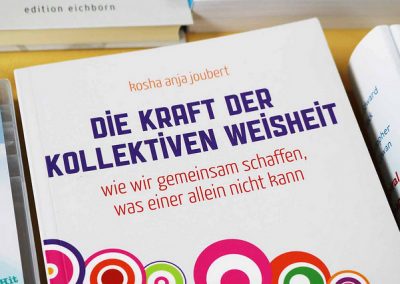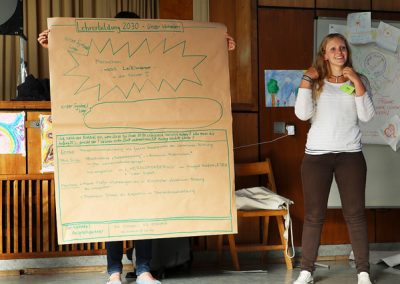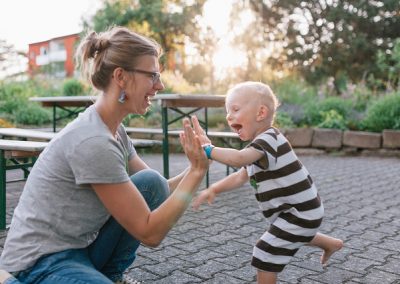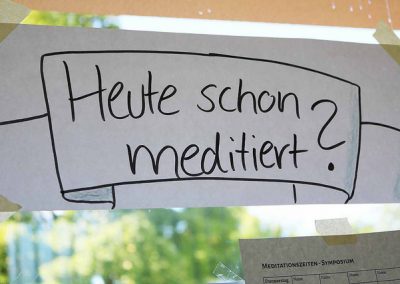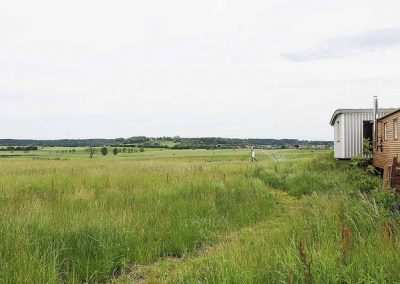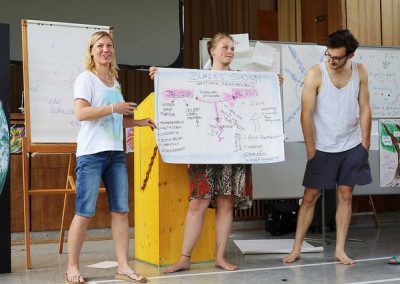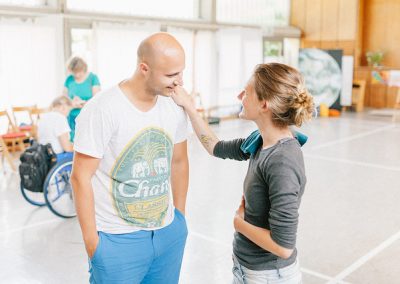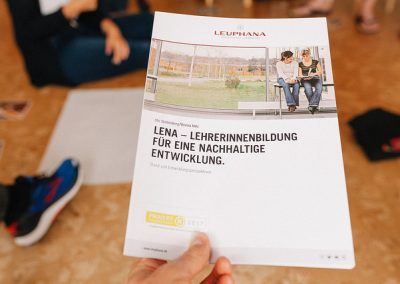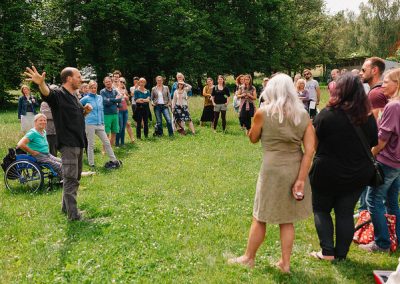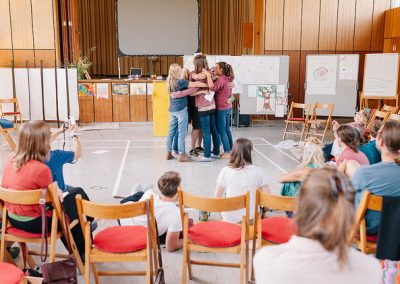
New learning needs new spaces
We live in a dynamic, changing and ambiguous world. Schools need new structures for the moments of change that we experience every day. Therefore, the main topic at the symposium Education & Consciousness is the creation of supporting structures for new internal and external learning spaces.
Questions that will occupy us are: What qualities are required for this? Which space sustainably supports learning and how does holistic learning work, where form and content complement each other?
We take 4 days to think outside the box and network for a better world of education. We bring together the various aspects of design, from the architecture of modern schools to the design of relationship spaces.
Creating positive learning spaces will play a central role. The inspiring lectures and workshops from education and business show ways to succeed in shaping society. Space for exchange, for one’s own reflection and for the (further) development of one’s own projects are what characterises the symposium for everyone individually and as a network and community.
Among them are initiators who have been taking small steps for a big change for a long time and are infecting with inspiration: e.g. Otto Scharmer, Presencing-Institute, Education 4.0, Valentin Helling, Alemannenschule Wutöschingen: Paths to individualized learning, Prof. Marcelo da Veiga, founder and long-standing director of Alanus University and expert in social entrepreneurship; Karin Doberer, redesigning schools as a “learning landscape”; Prof. Dr. Wilfried Schley, Intus hoch drei; Sigrid Schell Straub, EPIZ Reutlingen “The Whole School Approach”; Ernst Gugler, “Sinnreich” Austria’s most innovative green building; Bernhard Hanel, KUKUK Freiflug, artistically designed play and outdoor spaces; Amir Freimann, The Teachers Path (Israel), Mugove Walter Nyika, Permacultur Institute Malawi, Green schools. And in the Dialog Forum Bernhardt Schwandt, Dipl.- Wi. Ing., Raum- Wohn- und Energiekonzepte, Ulrike Bernard, Director of the socio-cultural centre Haus Steinstrasse, Leipzig
Mugove Walter Nyika gives a look beyond the horizon to the Greenschools movement in Africa. Amir Freimann takes another such look at the educational movement in Israel.
The event will be moderated by Martin Bruders and Susanne Brian.
The 17th IP-Building Dialogue Forum – Building for Education – will take place on 12 May as part of the symposium. Companies and entrepreneurs* are invited to present themselves on the marketplace.
Organic food from our own production on site and offers for morning yoga and a room of silence for meditation round off the symposium.
In terms of sustainability, the symposium is an educational event where form and content complement each other to form an effective unit, and it does not only talk about sustainability and building for the future, but that is also part of it.
Programme 2018
… inspiring talks

Understanding learning in relationships in new ways
Keynote Wilfried Schley
How do teachers create atmospheres? How do they develop the children’s desire to learn and their own joy in educational activity?
Development takes place in social spaces. These are characterized by qualities of resonance and atmosphere. They form the basis for positive emotions and constructive learning contexts. The professional basis is laid by trust and confidence. Well-founded atmospheres lead to activation. Teachers need a feeling for needs, concerns and motivations. Interactions only succeed in contact and encounters with their students.
The complexity increases and the roles change. Teachers have to look at their self-efficacy and not at what the students are delivering. This raises the question of future skills. Creativity, imagination, encounter are in the foreground. The presentation invites you to take a new look at the role of teachers and shows essential competencies. We say goodbye to content management and evaluation and strengthen the impulses of encouragement and confidence. Come with us on an exciting journey.

Education in the context of Liquid Modernity, VUCA* and Digitalization
Keynote by Marcelo da Veiga
Formal education subliminally is still understood as adaption to the current system. There is a natural and societal-economic reality and if you want to get along with it you need to learn to adapt. This commonplace is opposed by the fact that humans are faced by unknown challenges in nature (ecology), society (societal justice) and in personal life (finding purpose and meaning).

Go until the edge of your desire
A printing plant becomes gugler*s realm of senses
Keynote by Ernst Gugler
Ernst Gugler is enterpreneur, visionary and yogateacher. He understands his enterpreneurship as a chance to meaningfully meld enterprise, sustainabilty and spirituality in order to transform dreams and desires into reality with the strength of economy. The result is Austria’s greenest printing plant, circular flow economy in all facets, mindfulness in management and workaday life and finally: gugler*s Sinnreich – a soulful campus.

The importance of free play for the development of children and young people
Impulse by Bernhard Hanel
For small children, the meaning of something is first and foremost revealed through the senses: touch, smell, hearing, seeing are the basic conditions that literally grasp the world. By trial and error, the child learns to assess its abilities and to trust them more and more. Thus it learns playfully which challenges it can and which it cannot (yet) master. It is precisely through this constant exploration of its limits that the child gradually acquires the space in which it moves and experiences in this active and playful examination of the world that it can shape and change its environment. We call this activity Play. While playing, the child experiences itself in the living encounter with others. Sufficient time and space must be available for this, because every child has its own rhythm and feels best when an alternation between tension and relaxation is necessary.
“Original game doesn’t solve conflicts, it makes them superfluous.”
Fred. O. Donaldson

Bildung 4.0 – How to bring change into the world
Interactive dialogue with Otto Scharmer
With his book “Theorie U” and the u.lab, Otto Scharmer laid the foundation for a new understanding of leadership: drawn by the future instead of driven by the past. He has developed a model to understand change and tools to shape it to meet the needs of sustainability and global responsibility in management and education.

The Whole School Approach
Impulse by Mugove Walter Nyika
Mugove Walter Nyika talks about how schools in Zambia, Uganda, Zimbabwe, Malawi and Kenya are being transformed with the help of a Whole Institution Approach. The whole environment and the environment is involved – pupils, parents, teachers and local organisations.

Learning needs space: The Alemannenschule Wutöschingen forges new paths
Impulse by Valentin Helling
There are many wishes for a modern school: integration, inclusion, all-day school, digitisation, individualisation and potential development. A new room concept helps: The Alemannenschule in Wutöschingen is an educational institution with such a room concept.
In order to cope with greater individualisation and to provide every child with the best possible learning space, various spaces are needed: spaces for communication, for relaxation or to connect with the world. But also rooms for knowledge acquisition and presentation. Rooms for retreat and community, for well-being as well as for performance and learning.
In a friendly cooperation between school, community, parents, teachers and pupils, a conversion with an open space concept was created. Learning space becomes living space. Teachers and students feel comfortable, a lot of stress has disappeared from the system. Valentin Helling will tell us how this succeeded.

Schooldevelopment succeeds if Paedagogy, Architekture and Infrastructure connect
Impulse by Karin Doberer
Equitable facilitation, all-day school and continuous educational reforms require new approaches in the areas of learning culture, team culture and spatial culture. As pedagogical consultants, we are aware of the efforts, uncertainties and fears associated with school development and changes in existing learning locations.
The aim is to balance the design idea, the pedagogical approach and the usually very tight financial framework. Through an early, intensive and planned support of all project participants, individual, precisely fitting design and possibilities for optimisation are developed.
At the beginning of any change process, fear, concern and bureaucratic hurdles must be overcome. This requires courage and consistency in implementation from all those involved in the construction and planning process.

Becoming Homeless as an Educational Goal
Philosophical talk with Amir Freimann and Silke Weiß
“You may find yourself in a beautiful house / With a beautiful wife / And you may ask yourself / How did I get here?” (Once in a Lifetime, song by Talking Heads)
Many see “homemaking” as one of the main goals of education.What about education that cultivates the independence, courage, spirit of adventure and confidence needed to leave “home” – the familiar, comfortable and limited area that one has gotten used to? What about education that encourages and supports homelessness – with the freedom, flexibility, non-attachment, availability and creativity that come with it?
… integral workshops

Relationship Spaces
Training of perception as a basis for competence and self-efficacy
Workshop with Prof. Dr. Wilfried Schley
Welcome to the learning studio for contact and relationship. I will guide you through the relationship landscape to the basic attitudes that have a positive influence on your students’ experiences. You get to know the films from Intus hoch drei and experience your perception and sensitivity for situations and encounters. The journey continues to strengthening your intuition. You gain confidence in the spontaneous development of solutions. A feeling for gestures, facial expressions and feelings is part of your professional competence. You will get to know the body markers and train your perception.

From teacher* to coach
Workshop with Kathrin Funk and participants of the LernKulturZeit-Akademie
Which internal and external structural changes lead to a change of roles and attitudes for teachers and learning guides? What changes result from this for the learning culture in schools and the individualized promotion of pupils? In the practical part we explore which qualities support us in establishing new behaviour and try them out together.

Making Educational Institutions Sustainable – Whole Institution Approach
Holistic, global, just and sustainable
Workshop with Sigrid Schell Straub
How can we promote Global Learning (GL) and Education for Sustainable Development (ESD) in our schools and institutions of teacher training and further education not only through learning processes in teaching units, but also anchor them holistically and act on what we teach?
… becoming active

Yoga, Meditation, QiGong
Relax, feel the body, integrate. In silence there is space for reflection and deepening. We see these contents as part of a holistic culture of learning and living.
In the morning we offer meditation, yoga and qi gong. In addition the room of mindfulness is available 24 hours a day.

Marketplace
On Saturday afternoon, the marketplace offers the opportunity to get in touch with inspiring initiatives, ask questions, listen to stories and receive tips from and for practical use.
Including LernLandSchaft, facilitatos in the school development process on a structural and personal level, LernKulturZeit-Akademie, opportunities for personal and school potential development, WirbauenZukunft, an experimental space for sustainable living and living in the future, Akademie für angewandtes gutes Leben, community project, and the project office in which own ideas can be developed further.
Under the theme Building for Education the 17th IP-Building Dialogue Forum will also be a guest at the symposium. Parallel to the marketplace, this format offers, exchange opportunities for experts from research and industry, municipalities, regional associations and professional associations. In order to design sustainable schools in a joint effort.

Symposium in Action
Refuelled with input and inspiration, the focus now lies on own projects. Supported by workshops and project offices, visions can be developed, challenges can be examined from different perspectives and concrete next implementation steps can be taken.
The initiatives of the marketplace help with their expertise and know-how for the opening of creative spaces. In Case Clinics, with Social Presencing Theatre and Design Thinking we take a look at your project together.
The UNESCO Sustainable Development Goals
On 25th of September 2015 the heads of 193 states admitted themselves to 17 global goals to achieve exceptional things within 15 years:
- End extreme poverty.
- Fight inequality and injustice.
- Adjust climate change.
In order for these goals to be attained everyone has to know about them. If the goals are well known all across the world they will not be forgotten. Worldwide people stand up to achieve these goals. In Germany they can be a source to think afresh about the orientation of our educational system.
All of these goals are important and challenge us. Two of them have inspired us particularly for this years’ Symposium:
If Schools become all-day school we have to create rooms in which we feel comfortable and good. Real living environments that invite and support us in all facets of being human and that are experimental areas for resilience. At the Symposium Karin Doberer (LernLandSchaft) and Mugove Walter Nyika (Greening schools in Malawi, Zambia, Zimbabwe, Uganda & Kenia) will give impulses on healthfulness and wellbeing in schools.
Speakers and Team 2018
-
 More info
More info -
 More info
More info -
 More info
More info -
 More info
More info -
 More info
More info -
 More info
More info -
 More info
More info -
 Education 4.0 – Bringing Change into the worldMore info
Education 4.0 – Bringing Change into the worldMore info -
 More info
More info -
 More info
More info -
 Lernen braucht Raum: Die Alemannenschule Wutöschingen geht neue WegeMore info
Lernen braucht Raum: Die Alemannenschule Wutöschingen geht neue WegeMore info -
 More info
More info -
 More info
More info -
 More info
More info -
 More info
More info
The Programme 2018
To shape education sustainably, there is a need for inner and outer structures that give support in times of change. The different design parts are brought together at the symposium: from modern school architecture to shaping relational spaces. The topic of shaping learning spaces in positive ways will play a key role. There will be inspiring presentations and workshops from the educational and economic field which will show us ways how we can sustainably shape society. The symposium is exciting for individuals, networks and communities who will have room for exchange, for reflecting and for developing their own projects with elements of social presencing theatre.
The event is completed by good, locally produced organic food, offers of Yoga and Chi Gong in the mornings and a 24 hour space of silence with and ongoing meditation.
With inspiration from impulse givers with educational background and out of the box thinking, with best practice examples and honest exchange about what works and what is forward-looking. In the name of sustainability the Symposium is a educational space where form and content complete each other to build an effective whole where sustainability is inside and not only written upon.
3 pm – Guided tour through Schloss Tempelhof
5 pm – Opening of the Symposium. Greeting and Outline.
6 pm – Keynote Silke Weiß: Inner and Outer Structures of a Sustainable Learning Culutre
6.30 pm – Presentation Prof. Dr. Wilfried Schley
Keynote Wilfried Schley
How do teachers create atmospheres? How do they develop the children’s desire to learn and their own joy in educational activity?
Development takes place in social spaces. These are characterized by qualities of resonance and atmosphere. They form the basis for positive emotions and constructive learning contexts. The professional basis is laid by trust and confidence. Well-founded atmospheres lead to activation. Teachers need a feeling for needs, concerns and motivations. Interactions only succeed in contact and encounters with their students.
The complexity increases and the roles change. Teachers have to look at their self-efficacy and not at what the students are delivering. This raises the question of future skills. Creativity, imagination, encounter are in the foreground. The presentation invites you to take a new look at the role of teachers and shows essential competencies. We say goodbye to content management and evaluation and strengthen the impulses of encouragement and confidence. Come with us on an exciting journey.
8.30 pm – Candle Light at the Castle Café
Relaxed get together in the castle café’s ambience.
7 – 8 am – Yoga|Meditation|Chi Gong
9.45 – 10.45 am Presentation Ernst Gugler
Go until the edge of your desire
A printing plant becomes gugler*s realm of senses
Ernst Gugler is enterpreneur, visionary and yogateacher. He understands his enterpreneurship as a chance to meaningfully meld enterprise, sustainabilty and spirituality in order to transform dreams and desires into reality with the strength of economy. The result is Austria’s greenest printing plant, circular flow economy in all facets, mindfulness in management and workaday life and finally: gugler*s Sinnreich – a soulful campus.
11.00 am – 12.00 pm Presentation Marcelo da Veiga
Education in the context of Liquid Modernity, VUCA* and Digitalization
Keynote by Marcelo da Veiga
Formal education subliminally is still understood as adaption to the current system. There is a natural and societal-economic reality and if you want to get along with it you need to learn to adapt. This commonplace is opposed by the fact that humans are faced by unknown challenges in nature (ecology), society (societal justice) and in personal life (finding purpose and meaning).
Instead of acting on the assumption of security one rather has to ask: How does education need to change and which institutional frameworks and new skills are required to step into an uncertain, complex and ambigious future?
* the term VUCA summarizes the challenges which companies have to face in an increasingly digitalized world (V = volatil, U = uncertain, C = complex, A = ambigous)
3 – 6.30 pm Workshops * Relationship Spaces
Relationship Spaces
Training of perception as a basis for competence and self-efficacy
Workshop with Prof. Dr. Wilfried Schley
Welcome to the learning studio for contact and relationship. I will guide you through the relationship landscape to the basic attitudes that have a positive influence on your students’ experiences. You get to know the films from Intus hoch drei and experience your perception and sensitivity for situations and encounters. The journey continues to strengthening your intuition. You gain confidence in the spontaneous development of solutions. A feeling for gestures, facial expressions and feelings is part of your professional competence. You will get to know the body markers and train your perception.
We continue with successful relationships at home and between school and parents. Here our staged videos offer exemplary scenes that will help your awareness unfold. You will become faster in perceiving and coming into a language of relationships. Like in improvisation theatre, the workshop invites you to master situations spontaneously and change roles. Your actions will be more varied. Your self-efficacy unfolds.
3 – 6.30 pm Workshops part 2: * From Teacher to Coach
3 – 6.30 pm Workshops part 3: * The Whole Institution Approach
8 pm Interactive Zoom-Session with Otto Scharmer: Education 4.0 - Bringing Change into the World
7 – 8 am – Yoga|Meditation|Chi Gong
9.30 – 10.15 am Mugove Walter Nyika - Greening Schools
The Whole School Approach
Impulse by Mugove Walter Nyika
Mugove Walter Nyika tells how schools in Zambia, Uganda, Zimbabwe, Malawi and Kenya are being transformed with the help of a Whole Institution Approach. The whole environment and the environment is involved – pupils, parents, teachers and local organisations.
10.45 – 11.30 am Valentin Helling - Learning needs space
Learning needs space: The Alemannenschule Wutöschingen forges new paths
Impulse by Valentin Helling
There are many wishes for a modern school: integration, inclusion, all-day school, digitisation, individualisation and potential development. A new room concept helps: The Alemannenschule in Wutöschingen is an educational institution with such a room concept.
In order to cope with greater individualisation and to provide every child with the best possible learning space, various spaces are needed: spaces for communication, for relaxation or to connect with the world. But also rooms for knowledge acquisition and presentation. Rooms for retreat and community, for well-being as well as for performance and learning.
In a friendly cooperation between school, community, parents, teachers and pupils, a conversion with an open space concept was created. Learning space becomes living space. Teachers and students feel comfortable, a lot of stress has disappeared from the system. Valentin Helling will tell us how this succeeded.
11.30 – 12.15 am Karin Doberer - Schooldevelopment succeeds if Paedagogy, Architekture and Infrastructure connect
Schooldevelopment succeeds if Paedagogy, Architekture and Infrastructure connect
Impulse by Karin Doberer
Equitable facilitation, all-day school and continuous educational reforms require new approaches in the areas of learning culture, team culture and spatial culture. As pedagogical consultants, we are aware of the efforts, uncertainties and fears associated with school development and changes in existing learning locations.
The aim is to balance the design idea, the pedagogical approach and the usually very tight financial framework. Through an early, intensive and planned support of all project participants, individual, precisely fitting design and possibilities for optimisation are developed.
At the beginning of any change process, fear, concern and bureaucratic hurdles must be overcome. This requires courage and consistency in implementation from all those involved in the construction and planning process.
2.30 – 5 pm Marketplace & 17th IP-Building Dialog Forum
On Saturday afternoon, the marketplace offers the opportunity to get in touch with inspiring initiatives, ask questions, listen to stories and receive tips from and for practical use.
Including LernLandSchaft, facilitatos in the school development process on a structural and personal level, LernKulturZeit-Akademie, opportunities for personal and school potential development, WirbauenZukunft, an experimental space for sustainable living and living in the future, Akademie für angewandtes gutes Leben, community project, and the project office in which own ideas can be developed further.
Under the theme Building for Education the 17th IP-Building Dialogue Forum will also be a guest at the symposium. Parallel to the marketplace, this format offers, exchange opportunities for experts from research and industry, municipalities, regional associations and professional associations. In order to design sustainable schools in a joint effort.
5 – 6.30 pm Symposium in Action: Developing your Project
Refuelled with input and inspiration, the focus now lies on own projects. Supported by workshops and project offices, visions can be developed, challenges can be examined from different perspectives and concrete next implementation steps can be taken.
The initiatives of the marketplace help with their expertise and know-how for the opening of creative spaces. In Case Clinics, with Social Presencing Theatre and Design Thinking we take a look at your project together.
8 pm – Playing with Sustainability with Mugove Walter Nyika
We will spend this evening with the new GEN (Global Ecovillage Network) card set on the dimensions of sustainable communities. Mugove Walter Nyika is already successfully using it to design schools. Together we find out how we can use the playing cards in school and school development.
9.30 pm – Music and Dance
7 – 8 am – Yoga|Meditation|Chi Gong
10 - 11 am Talk with Amir Freimann and Silke Weiß
Becoming Homeless as an Educational Goal
Philosophical talk with Amir Freimann and Silke Weiß
“You may find yourself in a beautiful house / With a beautiful wife / And you may ask yourself / How did I get here?” (Once in a Lifetime, song by Talking Heads)
Many see “homemaking” as one of the main goals of education.What about education that cultivates the independence, courage, spirit of adventure and confidence needed to leave “home” – the familiar, comfortable and limited area that one has gotten used to? What about education that encourages and supports homelessness – with the freedom, flexibility, non-attachment, availability and creativity that come with it?
11am – 12 pm Presentation of the Projects
12 – 1 pm Closure
Cost
Regular …… 290 €
Discounted …… 240 €
Sponsoring fee …… 390 €
Discount for Participants under 25 years …… 120 €
+ Accommodation&Catering
Organization:
Silke Weiß, Agnes Schuster, Susanne Brian, Martin Bruders, Amir Freimann, Kathrin Funk, Carina Schilling
Sustainability
If we talk about sustainability we mean more than protection of the environment, organic farming and renewable energies.
Sustainability has at least four levels: social, ecological, cultural and economic
Education for sustainable development does not only draw from the ecological aspect that most people connect with it. Sustainability does also refer to social and economic topics. To all those topics experts contribute knowledge on current developments which helps drawing a broad picture of the present challenges.


The location
The Future Lab Schloss Tempelhof
At the symposium we experience what it actually means, if people decide to lead a sustainable life. The vegetable in Schloss Tempelhof is produced organically, made possible through a so called “social farm”.
The wages are largely need based. A big value is set on good relationships and a lot of meeting spaces help in creating a stable community that masters everyday challenges in a participative and co-creative way. A school (“Werkrealschule”), which integrates the village as a learning opportunity, draws people from nearby and from distant parts of Germany

This post is also available in: Deutsch





